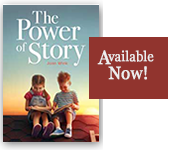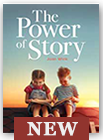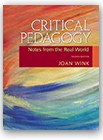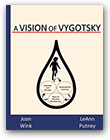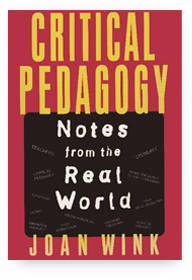pp.34-37
by Joan Wink
Published by Libraries Unlimited/ABCLIO
Copyright © 2018 by Joan Wink
As I reflect now on the literacy story to follow, I can see that there were pivotal literacy benchmarks: First, Pokémon paid a visit; second, Captain Underpants came calling; third, a scripted program threatened to undo Wyatt’s reading and destroy his self-confidence, until his mother, Dawn, pulled him out of school in the spring of his second-grade year. The fourth benchmark came two months later, when Wyatt began to read independently, Harry Potter.
Benchmark #1: Pokémon Pedagogy
Dawn, Wyatt’s mom, tells the story.
Hell has officially frozen over. This is what I muttered to myself as I stood in line about to purchase my first pack of Pokémon cards for Wyatt. Pokémon intuitively appalls me. Wyatt’s peers have been collecting the cards for years, but I refused to buy any for Wyatt.
“Mom, you and all the girls’ moms are the only ones who don’t allow Pokémon,” Wyatt told me earnestly one day. I remained unmoved.
Then one day, one of Wyatt’s friends came over to play. He brought his binder full of Pokémon cards to show Wyatt. I remember thinking, “Oh, no. How quickly can I get them away from those cards and onto the trampoline?” Except that Wyatt spent the next two hours reading those cards. He and his friend sat on the living room floor going over every letter and word in detail. As I dried dishes in the next room, I became aware of Wyatt’s efforts to read all of those cards. Wyatt usually shies away from any attempt at individual reading. Now he sat pouring over letters and words trying to make meaning.
“He’s reading!” I thought to myself.
The next day I purchased Pokémon cards and a collecting card binder. Wyatt has been reading those cards daily ever since. His literacy has grown considerably. (Wink, J., 2011, p. pp. 18-19)
Benchmark #2: Captain Underpants
I continued to read with Wyatt and his brother and sister. Our stories grew more and more complex, and Wyatt used extremely complex oral language.
He loved the complex action stories, with hints of the supernatural; for example, I have read the J.R.R. Tolkien series and the Redwall series, the entire Harry Potter series, umpteen Norse, Celtic, and Southwestern myths and legends to all three kids, but still Wyatt’s teachers told me they would have to intervene to help him begin to read. I agonized and reflected: Could it be that these stories were too intimidating for Wyatt to try to read by himself? Were the books simply too big, the print too dense, the visual clues too infrequent? Reluctantly, I switched from reading the Harry Potter series to the Captain Underpants series. Within days, Wyatt was decoding paragraph-by-paragraph and page-by-page. You can imagine my joy this week, as Wyatt read to me, not only Captain Underpants, but also Dr. Seuss (Wink, J., 2011, p. 19).
Benchmark #3: Pulling Wyatt Out of a Scripted Reading Program
“Mom, I’m so stupid. I’m just so stupid. I don’t understand any of this stuff,” Wyatt threw his head down on his folded arms at the kitchen table and cried.
“What are you working on there, Wyatt?” I asked. I sat down beside him to look at the worksheets of homework spread out in front of him. Black and white dittos filled with line after line of words broken down into incomprehensible parts. Slashes, dots, and hyphens turned words into a trail of shrapnel.
“Wyatt, I don’t understand how to do any of this, either, honey. Not a thing. You’re NOT stupid. This reading homework is stupid.” The next day I pulled him out of school to homeschool him for the remainder of the year.
Benchmark #4: Harry Potter
Two days ago, I walked through Wyatt’s room and discovered him lying on his bed reading aloud to himself. On my way through, I realized that he was reading Harry Potter and the Sorcerer’s Stone. I feigned casual nonchalance and kept walking until I was out of his room and on the other side of the door…when I immediately and silently started jumping up and down pumping “Yes! Yes! Yes!” into the air with my fist. Remember, this is the kid who couldn’t read two months ago.
As I walked up the stairs, different scenes from the past flashed through my mind; of the countless times I’d encouraged Wyatt to read to be met with stony silent tears; of the previous couple of years of complete and total refusal to try to read; of my awareness during that time that if I asked him to read, the entire mood of our time would change; would go from one of togetherness, happiness, and enthusiasm, to one of sadness; of the inevitable feelings of failure on both of our parts. And tears, always there were agonized tears involved, whenever Wyatt was asked to read….
Those memories floated back to me again that night when Wyatt and I cuddled in bed together, him now reading aloud to me Harry Potter and the Sorcerer’s Stone. “Oh, don’t worry Mom, I’ll just read this. You don’t have to read anything tonight. Here we go.” He read to me, page after page, complete with inflection and enthusiasm. He drank in the storyline, adventure, humor, and mystery.
I’ve also discovered that Wyatt is definitely a sight word reader. He is like his mommy, sounding words out, and phonics only serve to confuse us both. Wyatt sees a word the first time, learns it and from then on knows that word. I’ve learned when he’s reading aloud that when he stumbles on a word, if I just say it aloud immediately, he’ll look at the word, read it and move on. The next time we encounter that word, it will flow fluently from his lips. If I encourage him to sound it out, disaster follows; he gets very frustrated, the soft, warm, fun mood of our reading disappears, and he doesn’t commit that word to memory for the next time it’s read.
What do I attribute his newfound literacy to? … Well, obviously, the hours and hours and hours spent reading aloud, everything from children’s books to adult fiction, greatly influences the rapidity that he now gains reading fluently. Some of this event, I do believe is also just part of his inherent nature. Wyatt never crawled. He sat for nine months then one day stood up and started running, almost identical to his literacy journey.
Ultimately, though, it took me being ready to throw my beliefs about what we should be reading out the window, and being open to books that captured Wyatt’s fancy that he could read independently…namely…Tra la la! that weird little fellow in his BVD’s, Captain Underpants. Wyatt was so busy giggling at the delightfully disgusting adventures of these characters, with the words actually readable to him in small sections, which he completely forgot that he couldn’t read–in fact, he hated to read. Instead, he remained captured and engaged, reading about one deliriously appalling thing after another, giggling and exclaiming “Eeeeeeeeeeeeewwwwwww” happily throughout.
Now, he’s reading about Harry Potter flying about on his broom, high above the Quidditch field, in search of the golden snitch. And along with Harry, Wyatt, too, has learned to fly.
I remember vividly Wyatt’s experiences with literacy, and I remember the courage it took for Dawn to simply pull him out of school that spring. I remember Wyatt lying around on the couch reading, reading, and reading—with periodic stops to run and play as hard as he could. His teacher and her school firmly believed that there was one path only to literacy, and that was only phonics. Many early readers benefit from some phonics in the early grades, but not Wyatt. He needed the often-banned books of Happy Potter and Captain Underpants to break the decoding barrier and on to understanding and finally loving. To this day, he is an avid reader.
I grew up in a book driven home. Some of my best friends were not on the playground, but on a page.
(Kiwicat, http://www.kindspring.org/story/view.php?sid=95802)
